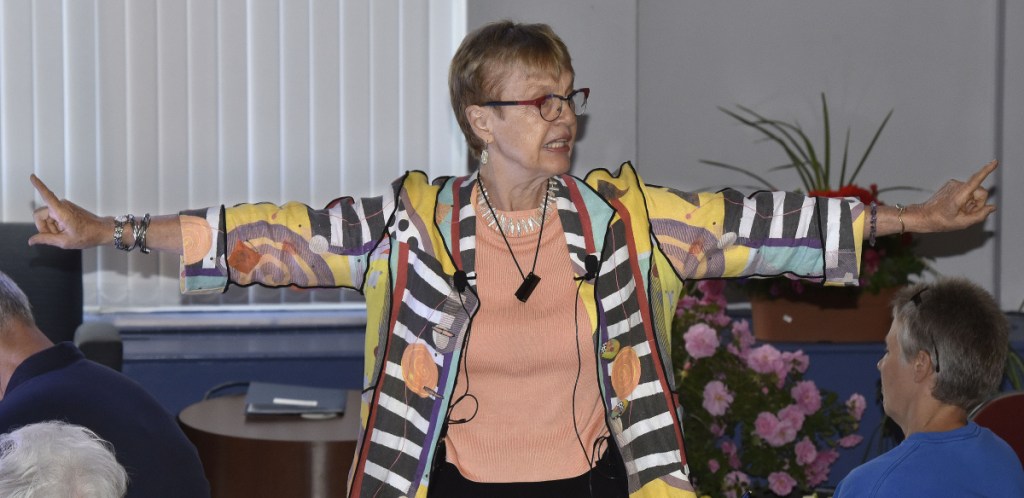Civility is very good for you. Last week’s column told you about some of the things I learned at the 32nd annual Thomas Nevola MD Symposium in June at Colby College. The symposium was very timely, focusing on civil discourse: “The Outward and Inward Work of Bridging Divides and Finding Peace in the Face of Differences.”
In the afternoon, I attended Fred Craigie’s discussion, titled, “Reflections for the inward work of civil discourse.” Craigie handed out a sheet with lots of awesome quotes. Here are three that really hit home with me.
Given my illness of ALS, this quote from Wayne Muller was significant: “The heart of most spiritual practices is simply this: remember who you are. Remember what you love. Remember what is sacred. Remember what is true. Remember that you will die and that this day is a gift. Remember how you wish to live.”
This quote from Gerald Jamplosky and Diane Cirincione applies to all of us: “There is now scientific evidence that going through life with a loving and forgiving attitude can affect our health in a positive way. There is growing evidence that when we live a life attached to anger, grievances, judgments and negative attitudes, we create conditions for poor health and delayed or stifled healing.
“It is important to emphasize that our thoughts and attitudes affect our bodies, minds, hearts and lives. As difficult as it may seem, we can always choose to be peaceful no matter what is happening around us.”
And then I loved this quote from the Dalai Lama: “Love, compassion and concern for others are the real sources of happiness. With these in abundance, you will not be disturbed by even the most uncomfortable circumstances.
“If you nurse hatred, however, you will not to be happy even in the midst of wealth. So if we really want happiness, we must widen the sphere of love. This is both religious thinking and basic common sense.”
Craigie led a conversation with the audience on the inward work of civil discourse. Here is the description of his talk: “The outward work of civil discourse involves learning to speak with other people in ways that promote dialogue and understanding. The inward work of civil discourse involves looking at our own thoughts, feelings and attitudes so we are emotionally and spiritually able to engage in respectful conversations with other people or, for that matter, to think and speak about people we are never likely to meet.”
Craigie gave us a handout that I want to share with you today. Here is what it says:
We have strong emotional reactions to the behavior of other people (some of whom we know and can interact with, and others, not). We can develop theories about where these emotional reactions come from, but we experience them as uninvited and often unwelcome.
In order to be able to engage approaches to having honorable dialogue with other people (or honorable ways of behaving in consideration of the people we may never meet), we need to work with these emotional reactions.
How do we change, mollify or soften these emotional reactions in order to be able to engage conversations with somebody else? Here are some themes, to affirm or complement what we are developing together:
• Mindfulness: Life is to be found in this present moment. Suffering is usually associated with having attention and heart in the past or future.
• Projection — I get upset by the things in others that are particular issues for me.
• Returning hate — Someone has to end the recurring cycle of hate and violence. Love.
• Neuroplasticity, rehearsal (ties in with group/herd identity) — I can recognize that my disparaging comments and behavior are efforts to be accepted by my herd. These responses are conditioned, strengthened … what we do becomes neurologically stronger. The way out is to be secure unto myself.
• Difficult people as teaching opportunities — Here are opportunities to learn the next steps in how you live your life.
• Higher calling. Remember who you are — Do not give other people power to make you into someone you are not. You can embrace and welcome your feelings but make choices based on your values.
• Compassion, recognizing others’ suffering — We are tempted to see people as enemies, fundamentally and irrevocably flawed. Other people are the way they are for reasons, understandable in their stories. Recognizing other people’s suffering can soften our own emotional reactions.
I can only hope that the messages from this symposium that I shared with you this week and last week will help you bring civility to your life. It will take all of us to revive civility and respect in and outside our communities.
George Smith can be reached at 34 Blake Hill Road, Mount Vernon, ME 04352, or georgesmithmaine@gmail.com. Read more of Smith’s writings at www.georgesmithmaine.com.
Send questions/comments to the editors.


